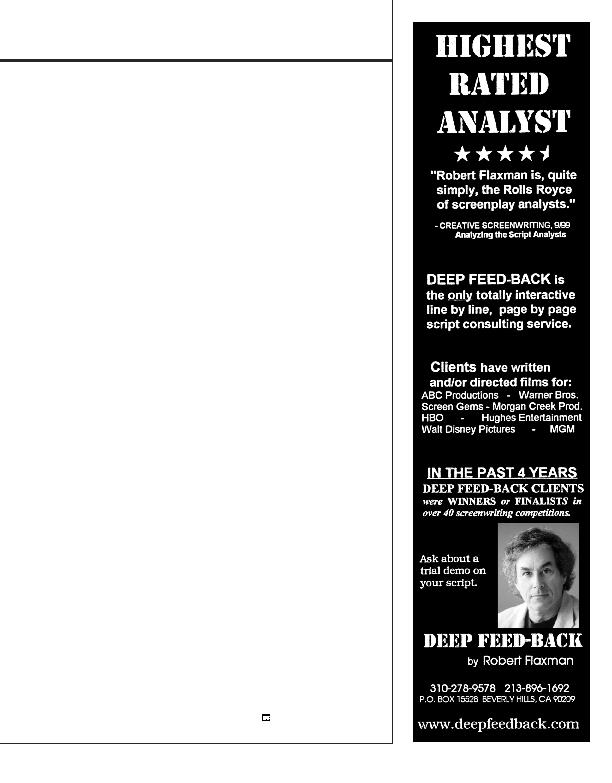
in Twilight," she says, "but I'll catch it -- or
someone else will."
film has had a different director. One
might expect this to be a unique challenge
-- adapting to an entirely different set of
sensibilities with each script -- but Rosen-
berg insists that the biggest challenges
have come during the revision stage.
Catherine Hardwicke directed the first film
and Chris Weitz directed the second; both
directors are also writers who felt comfort-
able making production changes to the
scripts. Eclipse director David Slade, on the
other hand, prefers to work on the script
before shooting and then stick to it there-
after. Thus, Rosenberg found herself work-
ing closely with Slade on the production
drafts to tailor them to his vision. Regard-
less of the revisions, when inventing dia-
logue, Rosenberg is careful not to stray too
far from the original intention of each
scene. "You start with what's in the book,
but sometimes something can read
smoothly on the page and then sound
corny coming out of an actor's mouth,"
Rosenberg says. "So I get notes from
Stephenie and the producers, and I rewrite
it and rewrite it, then give it to the actors
who might adjust it further. You just keep
working it until it sounds like something
someone might actually say."
writing Eclipse while working on the first
two films, thinking this one would be eas-
iest. It proved to be anything but. While
the third act is full of action, Bella's char-
acter arc is actually quite subtle. She starts
off convinced she wants to become a vam-
pire like Edward, but through the story
comes to realize she'd made that choice
without fully thinking it out. She also
starts to see Jacob in a new light -- so there
was also the challenge of making him a le-
gitimate rival for Bella as she and Edward
had been previously established as part of
an epic romance. According to Rosenberg,
the key to all of this, is, "[To] keep it hon-
est and authentic. It's a big story with a
world and a mythology that you can and
should use. You have a vampire with su-
characters and emotion have to be gen-
uine because you're building on that and it
will keep you rooted."
the movie, Bella hears the Quileute story
of the third wife -- a woman who saves
her village by spilling her own blood to
distract a rampaging vampiress. Whereas
the book takes the reader into Bella's head
to show the heroics she's prepared for,
Rosenberg needed a more visual answer to
that scene. "I couldn't use a thought bub-
ble," she says. "So I took Bella all the way
to actually spilling her own blood. It keeps
Bella's arc alive, her discovery of her own
strength, but it also saves Edward and serv-
ices that story as well. There's a lot of ac-
tion and stunts going on but at the peak
of the scene is this very human thing Bella
does that brings the heart of her story into
the scene."
be made to the source material in order to
make it filmic. As mentioned previously,
Twilight has inspired a legion of fans not to
be trifled with. They have invested them-
selves in these stories and they are very pro-
tective of them. Some fans feel Rosenberg
wasn't faithful to the books, while others
thought she did the perfect adaptation. For
her, this has been a lesson in the old maxim
that you can't please all the people all the
time. "As a screenwriter, your job is to tell
the best story possible in filmic terms,"
Rosenberg explains. "This means losing
things and changing things and there are
those who will never forgive you. But there
are also people who, no matter how suc-
cessful your film is, will call you a hack. It's
silly, but that sticks, and it hurts when you
realize that. When you already have the
demons and then you find yourself facing
criticism on an international level -- I un-
derstand why some writers hole up and try
to remain anonymous. It takes some really
thick skin to bounce back from that stuff. I
don't know how actors do it. But I'm glad it
hurts. I think when it stops hurting I need to
pack up and go, because I'll have gotten to
this weird place of ego where nothing
touches me."